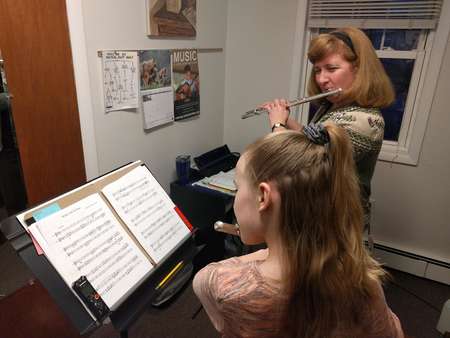From fingering charts for student guitarists to mnemonics that help novices navigate a keyboard (“All Cows Eat Grass”), music teachers have a wide array of teaching tools. But just as technology has been transformative in teaching subjects like math and science, it has also had a significant effect on giving music instruction.
Cindy Durrell is a music teacher with Community Music School in Trappe, Pa. She has found a number of advantages to using tech to assist her eager students:
EFFICIENCY
“Audio files can illustrate to students the general overview of a piece of music, leaving more time to focus on interpretation,” Durrell says. Even though her students study mainly wind instruments, she sees value for student vocalists and choirs, who can use recordings to grasp text and pronunciations sooner, especially for lyrics in a foreign language.
OBJECTIVITY
Objectivity. “A digital recorder ‘hears’ everything, the good and the bad, in a very objective way,” Durrell says. “Recordings from a practice session can alert a student to performance issues, without bias.”
SHARING
Durrell finds the ability to download files and email them to multiple students to be very helpful. “I can record rehearsals and distribute them easily, which is great for ensembles” she says. “I can keep students moving forward together, especially when one member of a group happens to be absent.
A built-in USB port in a digital recorder is a major plus. Using a smartphone app, I would need to either email the file or find a cable and download, both of which are time-consuming.
AUTONOMY
Durrell’s use of digital audio files lets her soloists work independently, practicing to a recorded accompaniment. “Instrumentalists can review notes and passages in context and are better prepared to work with a live accompanist,” she explains.
EVALUATION
“It’s one thing for me to tell students that they have improved. It’s another thing to let them hear that evolution for themselves,” Durrell states. “Digital files make it possible for students to hear their progress over time."
PORTABILITY
“I know I could record practices on my phone,” Durrell admits. “But digital recorders have gotten so small that it’s more convenient to have one close at hand – they’re about the size of a large pack of gum these days.”
SECURITY
Durrell states that the small size makes a digital recorder less likely to be accidentally lost or damaged. “I keep my recorder in my backpack; I always know where it is. My phone is everywhere – in the car, on a kitchen counter, on my night table. It is much more likely to be lost or damaged.”
If, as a music teacher, you want to bring the advantages of a digital recorder to your students, consider the Olympus LS-P4. It may be just the thing to keep your budding musicians on a path of growth, perhaps someday leading them to the Spotify 100.
